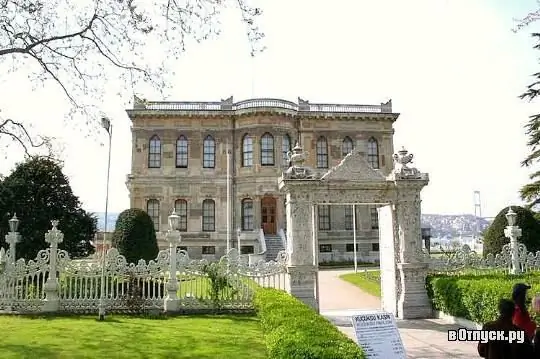
Description of the attraction
Kyuchuksu Kasra Palace (Little Water Palace), or, in other words, Göksu Kasra (Heavenly Water Palace) takes its name from the rivulets flowing here and flowing into the Bosphorus - Goksu and Kyuchuksu. The riverside itself is very picturesque. Kucuksu adorns the Asian coast of the Bosphorus in Beykoz.
Kyucuksu Kasri is a two-story castle located on the banks of the Göksu stream, in the Anatolian part of the city, between the Anadolu Hisary fortress and the Sultan Mehmed bridge. The palace was designed and built for Sultan Abdulmejid I by the Armenian-Turkish architects Grikor Amir Balyan and his son Nikogos Balyan (1856 - 1857). The famous architect owns the famous Dolmabahce Palace. But if Dolmabahce is a brilliant handsome man, treated kindly by the attention of tourists from all over the world and resting on the laurels of well-deserved fame, then Kucuksu Kasra can be called his younger brother. It cannot be said that he is a miniature copy of Dolmabahce, but common features are very noticeable - the same architectural techniques, small touches.
Divittar Emin Mehmet Pasha - the grand vizier in 1752 built a wooden mansion in honor of Sultan Mahmud I (1730-54) here, which eventually became obsolete and was destroyed, and the current building of the Kucuksu Kasra castle was built of stone in its place.
The castle is designed in the Baroque and Rococo styles and was the summer residence of the Sultan. This is a striking monument of the so-called Ottoman Baroque. This is the style practiced by the Armenian architects Balyan. The design of the castle successfully combines traditional Turkish motives mixed with European wonders. The invited craftsmen who built the Vienna Opera were responsible for the decoration of the premises.
Above the semi-basement, 2 more floors were built, the facade of the palace, which have a magnificent external finish. The basement floor was allocated for storage rooms, a kitchen, utility rooms and rooms for servants, while the upper floors housed the main salon and four corner rooms. This building was used for recreation or hunting gatherings only during the daytime, so bedrooms were not provided.
In general, the first impression that the castle of Kyuchuksu Kasra creates on tourists when they find themselves in it is a cascade of stairs that runs up right from the entrance to the right and left and merges into a narrow ribbon overhead. One of these baroque staircases leads to the salon on the second floor. On the second floor, a table of extraordinary beauty will attract the attention of any tourist - a rarity of the times of the principality of the future Sultan Abdulhamit II. The table is skillfully carved from wood without a single nail by the Sultan's hand. The Iranian carpet decorating this salon has a uniquely beautiful figured pattern of different animals. The precious things that fill the Kucuksu Kasra Palace. its decoration and interior are designed in the Ottoman style of the period of the sunset of the Ottoman rule: Czech glass chandeliers, marble from Italy, Turkish and Persian carpets, paintings on the walls - Aivazovsky's originals, huge mirrors designed to reflect and enhance the light of massive heavy chandeliers, amazing ceilings covered gold painting.
The carving that adorns the structure from the outside gives the palace a special flavor. The fountain, located in the garden, inside the palace, like the stairs, is made in the Baroque style. In 1803 it was built in honor of his mother Walide Mihrishah by Sultan Selim III. This fountain and pool, located in the garden, form one whole with the Kucuksu Kasra castle.
In 1944, the palace was turned into a museum, which to this day attracts much attention of visitors and tourists with its excellent carvings, carpets, crystal chandeliers and fireplaces.






